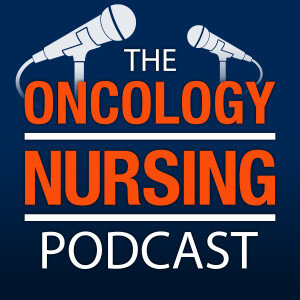
“When we are able to connect with the things that give us meaning in our life, it makes us stronger, it makes us happier, it makes our life more fulfilled,” Caroline Peacock, ACPE certified educator, LCSW, episcopal priest, and director of spiritual health and community care at the Winship Cancer Institute of Emory University in Atlanta, GA, said in a conversation with Jaime Weimer, MSN, RN, AGCNS-BC, AOCNS®, oncology clinical specialist at ONS. Peacock discussed how oncology nurses can support patients’ spirituality during cancer care. You can earn free NCPD contact hours after listening to this episode and completing the evaluation linked below.
Music Credit: “Fireflies and Stardust” by Kevin MacLeod
Licensed under Creative Commons by Attribution 3.0
Earn 0.75 contact hours of nursing continuing professional development (NCPD) by listening to the full recording and completing an evaluation at myoutcomes.ons.org by December 30, 2024. The planners and faculty for this episode have no relevant financial relationships with ineligible companies to disclose. ONS is accredited as a provider of NCPD by the American Nurses Credentialing Center’s Commission on Accreditation.
Learning outcome: The learner will report an increase in knowledge related to spirituality in cancer care.
Episode Notes
- Complete this evaluation for free NCPD.
- Oncology Nursing Podcast Episode 187: The Critical Need for Well-Being and Resiliency and How to Practice
- ONS Voice articles:
- The Case of the End-of-Life Evaluation
- Prevent Implicit Bias in Patient Care With These Cultural Conversation Starters
- How Do You Bridge the Gap Between Ethical Dilemmas and Spirituality?
- The Role of Patient Spirituality in a Culture of Safety
- Clinical Journal of Oncology Nursing articles:
- The State of Spirituality Scale as a Screening Tool for Spiritual Distress
- Challenges in Assessing Spiritual Distress in Survivors of Cancer
- Oncology Nursing Forum articles:
- Interprofessional Perspectives on Providing Spiritual Care for Patients With Lung Cancer in Outpatient Settings
- Spirituality and Uncertainty at the End of Life
- Spiritual Growth and Decline Among Patients With Cancer
- ONS book: Psychosocial Nursing Care Along the Cancer Continuum (third edition)
- Identify what gives your patients meaning.
- Center to Advance Palliative Care
- Emory University’s spiritual health resources
- Wellness videos
- Winship Cancer Institute’s spiritual health resources
- Listen to Our Stories, a podcast hosted by Caroline Peacock.
To discuss the information in this episode with other oncology nurses, visit the ONS Communities.
To provide feedback or otherwise reach ONS about the podcast, email pubONSVoice@ons.org.
Highlights From Today’s Episode
“When my team and I are approaching patients, what we want to know is what matters to that particular patient, what gives them a sense of meaning, what gives them a sense of purpose in their life—and we want to approach them without judgement.” Timestamp (TS) 04:22
“If you have a patient who is experiencing distress, I often recommend that you don’t say, ‘Would you like to see the chaplain?’ or, ‘Would you like to see spiritual health?’ I often recommend that you make the referral. We know how to interface with a patient. The reason I recommend that is because a lot of times, there’s a stigma associated with receiving help when someone is in distress.” TS 13:51
“When a person has a new diagnosis, that can be so overwhelming. Often, once they have a plan in place with their provider, their distress goes way down. I do think that after that first diagnosis, that’s often a point where spiritual health might want to interface, and when there’s changes in goals of care.” TS 16:23
“When we are able to connect with the things that give us meaning in our life, it makes us stronger, it makes us happier, it makes our life more fulfilled.” TS 23:37
“Let’s say a patient is just talking your ear off. . . and the nurse just doesn’t have the time or capacity to tend to the patient. It might be helpful to call in spiritual health to provide a little bit of companionship to that patient. That can actually help the nurse to be more effective in their work so they’re able to the medical needs that they’re needing to get to while we can absorb some of the spiritual and emotional content that the patient might be carrying.” TS 28:06
“A very simple question is, ‘What matters to you?’ It’s so basic, but I think that can help a nurse get to, when they’re having a conversation with a patient, what gives the patient a sense of meaning in their life. . . . And I think one thing that’s really important is to know that spirituality and religion are very complex. There’s a lot of diversity within any given group. It’s important for nurses to know that when they’re interfacing with a patient of a particular religious background not to assume that they maybe have all the same beliefs as other people within that particular religious group.” TS 30:07
“We consider staff to be part of our groups of people that we’re responding to, and my team and I care deeply about our nurses that work in healthcare settings. . . . Nurses have complex lives, and they’re dealing with all kinds of things within their own lives—challenges with family, appointment stressors, working very hard hours, having really hard patients, having heavy caseloads—all of those things can be extraordinarily overwhelming for healthcare staff and for nurses in particular.” TS 26:31
More Episodes
Create your
podcast in
minutes
- Full-featured podcast site
- Unlimited storage and bandwidth
- Comprehensive podcast stats
- Distribute to Apple Podcasts, Spotify, and more
- Make money with your podcast
It is Free
- Privacy Policy
- Cookie Policy
- Terms of Use
- Consent Preferences
- Copyright © 2015-2024 Podbean.com






